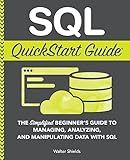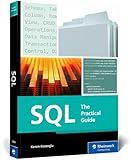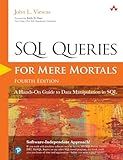Best SQL Books to Buy in February 2026

SQL QuickStart Guide: The Simplified Beginner's Guide to Managing, Analyzing, and Manipulating Data With SQL (Coding & Programming - QuickStart Guides)



Practical SQL, 2nd Edition: A Beginner's Guide to Storytelling with Data



SQL Programming QuickStudy Laminated Reference Guide



SQL for Data Analysis: Advanced Techniques for Transforming Data into Insights



SQL All-in-One For Dummies (For Dummies (Computer/Tech))



SQL: The Practical Guide to Master Relational Databases, SQL Syntax, and Sublanguages for Effective Database Management (Rheinwerk Computing)



SQL Pocket Guide: A Guide to SQL Usage



SQL in 10 Minutes a Day, Sams Teach Yourself



SQL Queries for Mere Mortals: A Hands-On Guide to Data Manipulation in SQL


In MySQL, the ORDER BY clause is used to sort the result set of a query based on one or more columns. It is typically used in SELECT statements to organize the returned data in a specific order.
The syntax for using ORDER BY in MySQL is: SELECT column1, column2, ... FROM table_name ORDER BY column1 [ASC|DESC], column2 [ASC|DESC], ...
You can specify one or more columns to sort the data by, along with an optional ASC (ascending) or DESC (descending) keyword to control the sort order. By default, the sort order is ascending.
For example, if you want to sort a table of employees by their salaries in descending order, you can write a query like this: SELECT employee_id, first_name, last_name, salary FROM employees ORDER BY salary DESC
This will return the data sorted by the 'salary' column in descending order, showing the highest salaries first. You can also sort the data by multiple columns, in which case MySQL will sort the data by the first column specified, and then by the subsequent columns in order.
In summary, the ORDER BY clause is a powerful tool in MySQL that allows you to sort the results of your queries in a meaningful way, making it easier to analyze and work with the data returned from your database.
What is the effect of using ORDER BY with a large dataset?
When using ORDER BY with a large dataset, the effect can be slower query performance. This is because the database server needs to sort all the rows in the dataset according to the specified column(s) before returning the results. This sorting operation can be resource-intensive, especially for large datasets, leading to longer query execution times.
To improve query performance with ORDER BY on large datasets, you can consider indexing the columns used in the ORDER BY clause, limiting the columns being returned in the query, or optimizing the query by using other techniques such as pagination or selecting only the necessary data. Additionally, consider utilizing database optimization techniques such as query optimization and proper indexing to improve overall performance when working with large datasets.
How to use NULL values in sorting using ORDER BY?
In SQL, you can use the keyword NULLS FIRST or NULLS LAST in the ORDER BY clause to specify how NULL values should be treated in the sorting of result sets.
Here is an example of how to use NULL values in sorting:
Suppose you have a table named "customers" with columns "customer_id" and "last_name" and you want to sort the results by last name in ascending order with NULL values appearing at the end of the result set.
SELECT * FROM customers ORDER BY last_name NULLS LAST;
In this example, the NULLS LAST keyword instructs the database to sort the last names in ascending order with NULL values appearing at the end of the result set.
You can also use NULLS FIRST if you want NULL values to appear at the beginning of the result set.
SELECT * FROM customers ORDER BY last_name NULLS FIRST;
By using the NULLS FIRST or NULLS LAST keywords in the ORDER BY clause, you can control how NULL values are handled in the sorting of your result set.
How to sort data based on custom expressions using ORDER BY?
To sort data based on custom expressions using ORDER BY in SQL, you can use a CASE statement within the ORDER BY clause. Here's an example:
Let's say you have a table called "employees" with columns "name", "salary", and "department". You want to sort the data based on the department in a specific order, for example, "Marketing", "Sales", and "Engineering".
You can achieve this by using a CASE statement within the ORDER BY clause like this:
SELECT * FROM employees ORDER BY CASE WHEN department = 'Marketing' THEN 1 WHEN department = 'Sales' THEN 2 WHEN department = 'Engineering' THEN 3 ELSE 4 END;
In this query, the data will be sorted based on the custom expression provided in the CASE statement within the ORDER BY clause. The records with the department "Marketing" will be sorted first, followed by "Sales", "Engineering", and any other departments in ascending order.
You can modify the CASE statement based on your custom sorting requirements.
What is the syntax for using ORDER BY in MySQL?
The syntax for using ORDER BY in MySQL is:
SELECT column1, column2, ... FROM table_name ORDER BY column1, column2, ... ASC|DESC;
The ORDER BY keyword is used to sort the result set in ascending (ASC) or descending (DESC) order. Multiple columns can be used for sorting, separated by commas.
